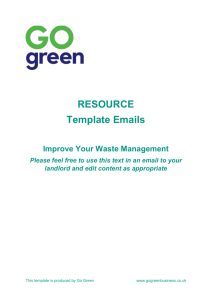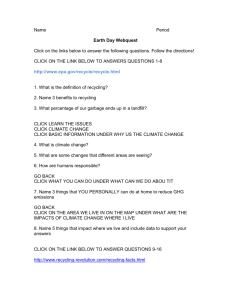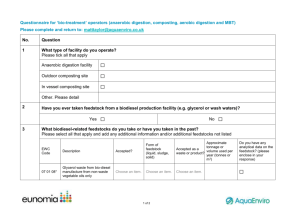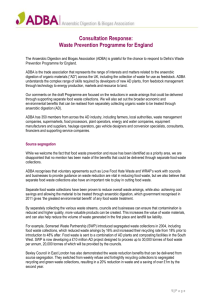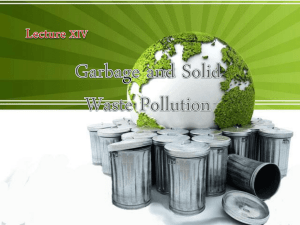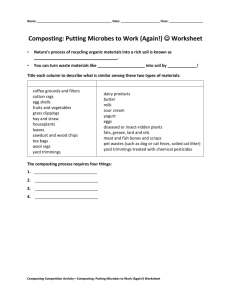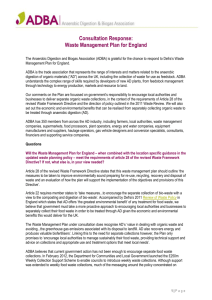Food waste - Friends of the Earth
advertisement
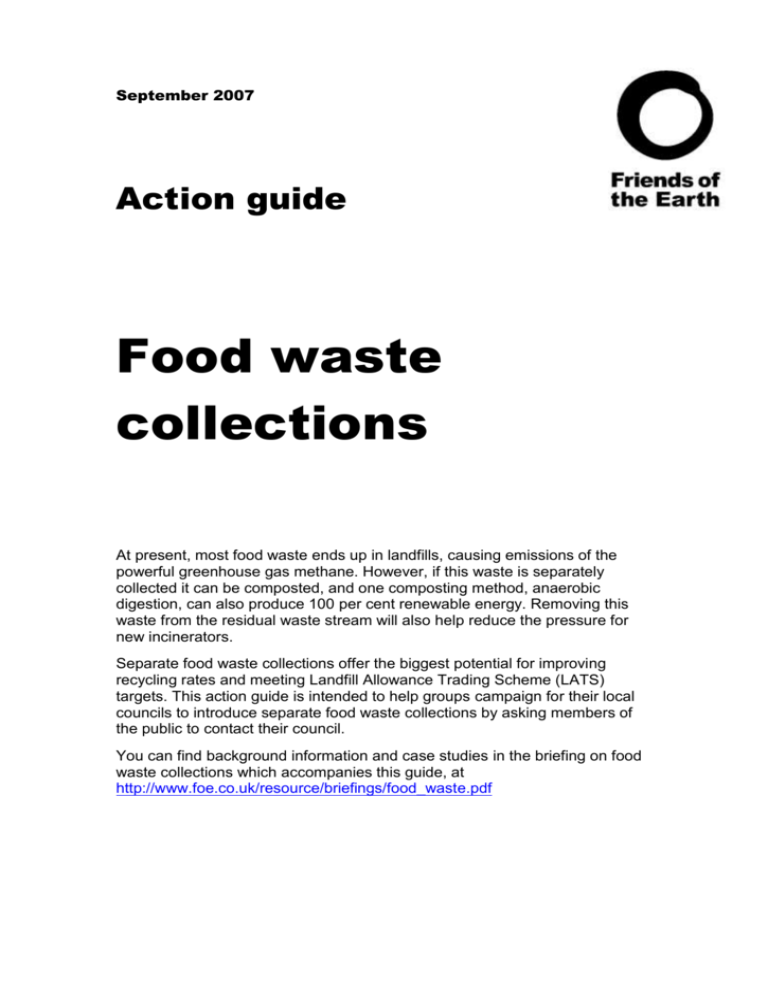
September 2007 Action guide Food waste collections At present, most food waste ends up in landfills, causing emissions of the powerful greenhouse gas methane. However, if this waste is separately collected it can be composted, and one composting method, anaerobic digestion, can also produce 100 per cent renewable energy. Removing this waste from the residual waste stream will also help reduce the pressure for new incinerators. Separate food waste collections offer the biggest potential for improving recycling rates and meeting Landfill Allowance Trading Scheme (LATS) targets. This action guide is intended to help groups campaign for their local councils to introduce separate food waste collections by asking members of the public to contact their council. You can find background information and case studies in the briefing on food waste collections which accompanies this guide, at http://www.foe.co.uk/resource/briefings/food_waste.pdf The action needed – lobbying for collections Contact your local recycling officer to ask whether they have considered introducing food waste collections, and if so, what they decided and why. A list of local authority recycling officers can be found here: http://www.letsrecycle.com/info/localauth/recycling_officers.jsp. This information can also be obtained by calling your council and ask to speak to the person in charge of kerbside recycling, or looking on their website. Next, use this information to adapt the enclosed template letter from your local group, asking them to introduce a food waste collection scheme and explaining the benefits this would bring. Ask other local groups and individuals to also send their own individual letters. Ask for a response in the letters and if you are able to, arrange a meeting. Find out whether your council run a home composting promotion scheme and if not, initially encourage them to contact WRAP to enquire into the funding available for councils to promote subsidised compost bins. If you are told it is not possible to introduce a kerbside food waste collection, find out why not. Adapt the template leaflet with your local council’s contact details and print out for local people to complete and send off. Councils do respond to pressure from the public so the more people you can get sending in the message the better. You could hold a stall to publicise your action to members of the public and to ask them to take part in the action. Contact your ward councillor The councillor for your ward is there to represent you and help you access services. If you have difficulty getting recycling services you can lobby your ward councillor to arrange it on your behalf. Also contact councillors on the relevant committee, especially the chair, who plays an important role in the decision-making process and can also let you know what has previously happened with the issue. Write to the councillors who sit on the committee in your district or borough council that deals with recycling. This may be a variety of committees - it varies in different councils - for example, it could be Waste Committee, Environment Committee, Technical Services Committee. To find out which is the appropriate committee and to find out which councillors it on it, simply telephone the Council. When you know which councillors you want to influence, contact them and ask them to start a food waste collection, or try to arrange to have a meeting with them. Key messages of the action People want separate food waste collection (lots of public support) Composting food waste is good for climate change Food waste collections will make it easier to bring in fortnightly residual waste collection, if the council wants to do this in the future 2 Resources and further information Template press release – see page 4 If possible, send out the press release to the local media at least a week in advance of the action. You can also generate your press release online here: http://community.foe.co.uk/campaigns/waste/press_release/index.html Template leaflet – see page 5 Please adapt the template with details of your local council, print each side of the leaflet onto a separate page and photocopy them to create a double-sided leaflet. The template is also available at: http://www.foe.co.uk/resource/model_communications/food_waste_leaflet.doc Anaerobic Digestion briefing http://www.foe.co.uk/resource/briefings/anaerobic_digestion.pdf Beginners guide to local authorities in England http://www.foe.co.uk/pubsinfo/briefings/pdf/guide_to_local_authorities_eng.pdf How to guides • Get your letter in the paper http://www.foe.co.uk/resource/how_tos/cyw_60_letter_in_paper.pdf • Run a kick ass stall http://www.foe.co.uk/resource/how_tos/cyw_56_run_stall.pdf • Fake it as a photographer http://community.foe.co.uk/resource/how_tos/cyw_38_photographer.pdf • Use the media: http://community.foe.co.uk/resource/how_tos/cyw_36_use_the_media.pdf Dealing with Food Waste in the UK recent report by Eunomia Research and Consulting http://www.wrap.org.uk/downloads/Dealing_with_Food_Waste_-_Final__2_March_07.f48740ef.pdf Useful websites: Composting Association Somerset Waste Partnership Greenfinch http://www.compost.org.uk/ http://www.recyclesomerset.info http://www.greenfinch.co.uk/ Contact details: For general enquiries about the action or about Friends of the Earth’s policy on waste please contact Becky Slater via beckys@foe.co.uk or call 020 7566 4079. Thanks for taking part in this important action. Waste and Resource Use Team Friends of the Earth 26-28 Underwood Street London N1 7JQ 3 You can also generate your press release online here: http://community.foe.co.uk/campaigns/waste/press_release/index.html Press Release Embargo: Immediate release Local campaigners call on council to help climate by collecting food waste PHOTO OPPORTUNITY: [TIME AND PLACE] Members of [YOUR GROUP] will be asking members of the public to tell [YOUR COUNCIL] that they want separate food waste collections in [YOUR TOWN]. [add extra information about what you have decided to do] Local environmental campaigners from [Your Group] take to the high street today/ Saturday to call on [Your Council] to introduce separate food waste collections. At present, most food waste ends up in landfills, causing emissions of the powerful greenhouse gas methane. However, if this waste is separately collected it can be composted, and one composting method, anaerobic digestion, can also produce 100% renewable energy. Removing this waste from the residual waste stream will also help reduce the pressure for new incinerators. The Government is currently putting pressure on Councils like [your council] to reduce the amount of food and other waste they send to landfill. Friends of the Earth considers that separate collection of food waste is a climate-friendly way for the council to turn this waste into a useful resource. Local Campaigner [Your Name] said: "Separate collection of food waste, followed by composting or digestion, is an effective way of reducing our climate impacts, and can even generate 100% renewable energy. Many other councils have introduced such collections, and we are calling on [your council] to do the same.” Notes [1] More information on separate collections of food waste can be found here: http://www.foe.co.uk/resource/briefings/food_waste.pdf Pictures from the day will be available [put your contact details here so the media know how to get hold of them. Don’t forget to add contact details for the person who will do the media interviews.] 4 Insert your council’s address here: ……………………………………………… ……………………………………………… ……………………………………………… ……………………………………………… Campaign to help the climate by introducing separate collection of food waste Food waste makes up around one fifth of household waste. Most food waste is still dumped in landfills, where it produces methane, a powerful climate change gas. Therefore reducing the amount of food waste sent to landfill is a key measure in tackling climate change. If food waste is collected separately from homes and businesses, it can be composted, which is better for the climate. Even better, it can be treated with ‘anaerobic digestion’, which generates 100% renewable energy. Please join us in asking … Council to introduce separate collection of food waste. The facts Dear ... UK households throw out around 5 million tonnes of food waste a year. I am writing to ask … Council to introduce separate collections of food waste. Most food waste ends up in landfills, breaking down to cause emissions of the powerful greenhouse gas methane. By keeping food waste out of landfill, we can avoid climate-damaging emissions of methane. Some councils are proposing to build incinerators as an alternative to landfill, but incinerators also contribute to climate change, by emitting fossil-fuel derived carbon dioxide and wasting energy that could be saved through recycling. There is a much better way to deal with food waste collecting it separately and composting or digesting it. Composting returns nutrients and structure to soils; displaces other fertilizers; sequesters carbon; and, in the case of anaerobic digestion, produces 100% renewable energy. I am asking that the council introduces separate collection of food waste for all households, followed either composting, or ideally by anaerobic digestion, which can generate renewable energy. I also want the council to encourage people to do home composting, where this is possible. Please could you tell me whether you have any plans to introduce separate food waste collections? I look forward to hearing from you. Yours sincerely, You can also compost most of your food waste at home - (check if your council offers reduced cost composting bins at recyclenow.com and add details) Name …………………………………………………… Help your council get its waste out of landfill – and help the climate by getting them to set up a food waste collection. …………………………………………………………… Address ………………………………………………… …………………………………………………………… If you would like your council to offer a separate food waste collection, please fill in your name and address opposite and send it to the address overleaf. 6

